December 26, 2018 Updated: December 26, 2018Share
A new round of chilling phone calls reveals that live organ harvesting of Falun Gong practitioners is still happening in China in a variety of leading transplant centers in different regions.
The calls also show that this “business” has become “normal” in these hospitals: none of the doctors—all leading figures in organ transplantation in China—showed surprise, dismay, or anger when asked “whether the organs are harvested from Falun Gong practitioners.”
The calls are the latest research documenting forced organ harvesting in China, which developed as part of the persecution of the spiritual practice of Falun Gong, also known as Falun Dafa.
Immediate Admission
A transcript from one call goes: “I have another [question]. You are using Falun Gong practitioners as the donors, that is, those healthy donors, right? ”
“Definitely healthy. How can it be acceptable if they’re not healthy?!”
The above conversation happened between Dr. Wang Zhiyuan, president of the World Organization to Investigate the Persecution of Falun Gong (WOIPFG), posing as a relative of a patient who needed a liver transplant, and Peng Zhihai, Director of Organ Transplantation Center and Vice President of Shanghai General Hospital, on Nov. 11, 2018.
In addition to posing as a relative, Wang also represented himself as the vice director of the Stability Maintenance Office of Sichuan Provincial Political and Legal Affairs Commission, which likely encouraged the doctors he called to speak more candidly than they might to the ordinary individual.
The Political and Legal Affairs Commission is responsible for the persecution of Falun Gong. As a high-ranking official in the Commission, Wang could be assumed to be knowledgeable about the forced organ harvesting—the doctors may have felt they were speaking to a co-conspirator.
Moreover, hospitals and doctors would want to maintain a good relationship with this commission to get organs from Falun Gong practitioners.
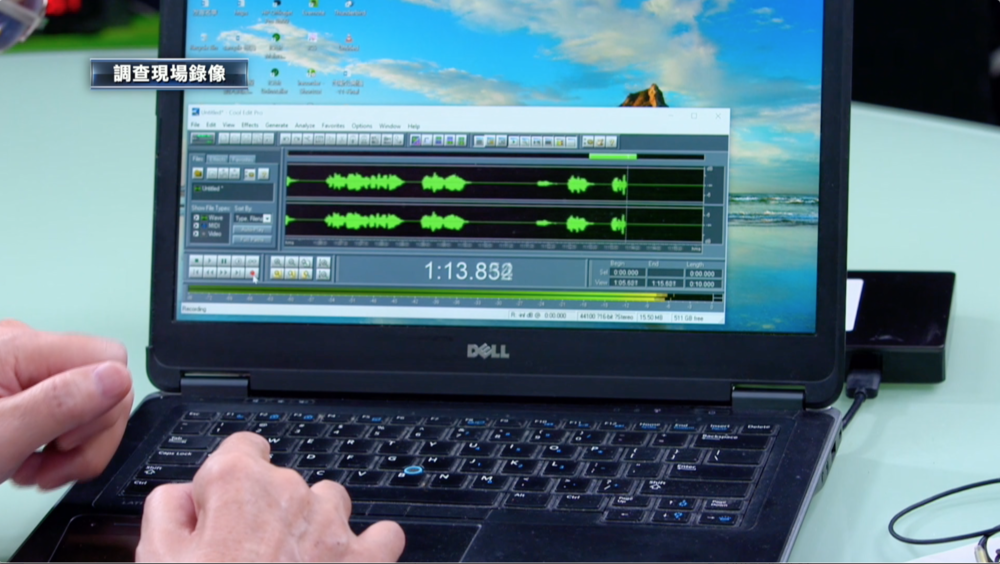
The laptop of Dr. Wang Zhiyuan, president of the World Organization to Investigate the Persecution of Falun Gong, as he records a phone call to a transplant doctor in China, in New York City on Nov. 2, 2018. (Screenshot/NTD)
In the report released by WOIPFG, out of 16 doctors who talked to Wang, 11 doctors from 9 hospitals immediately admitted that their organs came from Falun Gong practitioners, the other 5 doctors either didn’t deny the organs were from Falun Gong practitioners, or avoided responding to this question.
But none of the doctors showed any surprise or anger when being asked whether the organs were from Falun Gong practitioners, as if harvesting organs from living Falun Gong practitioners is “business as usual.”
“This round of investigation was conducted between Oct. 19 to Dec. 2, 2018, and involved 16 doctors from 12 hospitals in China,” said Wang who, in addition to being president of WOIPFG, was also a former chief physician for the People’s Liberation Army Air Force, and a former histology research specialist at the Harvard Medical School.
“The 12 hospitals range from Beijing, Tianjin in the north, all the way down to Shanghai, Nanjing and Guangzhou in the south.
“The investigated doctors are all either presidents or directors of top-level organ transplant hospitals in China. Many are responsible for state-level projects in the field of organ transplantation,” Wang said.
‘No Ischemia Liver Transplant’
This round of investigation recorded seven doctors admitting that both organ harvesting and organ transplantation are done at their hospitals.
Given how rare it is in the United States, with a fully developed system for organ donation (unlike China, whose organ donation system was only recently introduced and has so far had very limited success), for someone to die in the same hospital at which a matching recipient is waiting for an organ, the widespread harvesting of organs in the same hospital that a transplantation is done is deeply suspect. It suggests the doctors are killing the organ donor by means of harvesting the organs.
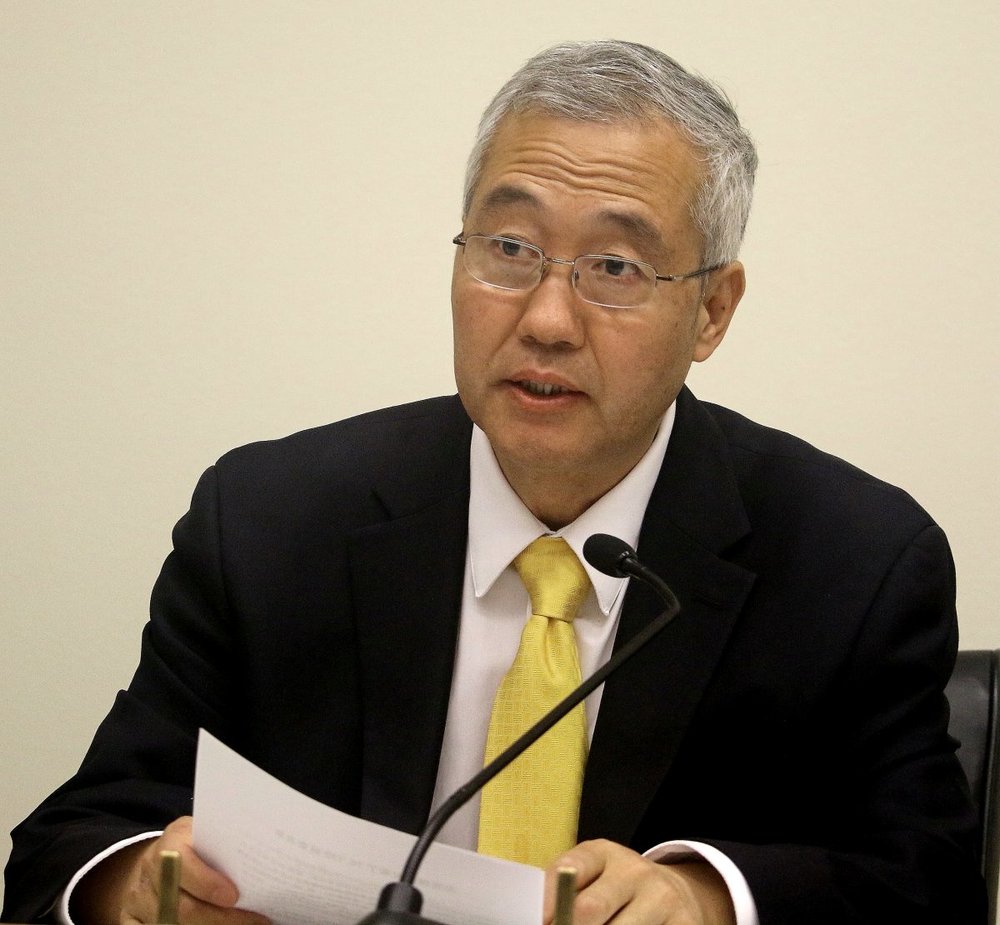
Dr. Wang Zhiyuan, president, World Organization to Investigate the Persecution of Falun Gong, speaks at a forum on Capitol Hill in Washington, on May 26, 2016. (Gary Feuerberg/ Epoch Times)
This seems to be explicit in the case of one doctor boasting about a “no ischemia liver transplant.”
Ischemia is the inadequate supply of freshly oxygenated blood to an organ, and dealing with the ischemia time—the time an organ is without such blood supply—is a significant issue for transplantation, impacting chances of rejection, survival rates, and outcomes for the recipient.
In most transplantation surgeries around the world, after organs are procured they are kept chilled in both a cold preservative solution and crushed ice in order to preserve them. During this time there is no warm, oxygenated blood flow to the organ. This is called “cold ischemia time.”
There is also another measure of ischemia time, called “warm ischemia time,” which measures the time the organ is still in the body but not receiving freshly oxygenated blood (typically because the heart has stopped). Warm ischemia time ends when the organ is perfused with a cold solution and then quickly extracted and put in ice, awaiting transplantation into the new host body.
Livers, and especially the heart and lungs, are particularly sensitive to ischemic damage, and require minimal warm ischemic time to ensure a successful graft.
The following is the conversation between Wang and He Xiaoshun, Vice President of the First Affiliated Hospital, Sun Yat-sen University in the city of Guangzhou in southeastern China on Nov. 16, 2018.
Wang: “You mentioned that you have a new technology, that is, which can shorten the warm ischemia time, correct?”
He Xiaoshun: “Correct, we do have it… actually, it is not shortening the time, it is to (inaudible).”
Wang: “Oh, really? That means there is no more warm ischemia time at all, right?”
He Xiaoshun: “Right, right. We always perform the [organ] transplants when the livers have continuous blood circulation during the whole process.”
Wang: “Oh, being performed when there is always blood circulation. What is the name of your technology?”
He Xiaoshun: “It is. We call it ‘no ischemia.’ There is no loss of blood, so it is called ‘no ischemia liver transplant.’”
Wang: “Oh, let me confirm with you one more time. So, the organs you currently use are all from Falun Gong [practitioners], who are healthy. So they are very healthy organs, right?”
He Xiaoshun: “Uh, right. There is no need to rinse [the organs] with ice-cold water or to preserve them in ice. All such procedures can be omitted!”
Wang: “Oh, that makes sense. So inherently, organs from Falun Gong [practitioners] are very good, on top of that, there is no issue of warm ischemia, it would be even better.”
He Xiaoshun: “Right, right.”
Wang said that “no ischemia liver transplant” could only happen when the organs were harvested from living human beings.
That these doctors had no problem admitting that the organ harvesting happened in the hospital to ensure the “quality of organs” indicated that live organ harvesting, or killing people for their organs were still happening in the hospitals, Wang said.
‘We May Have It As Soon As Tomorrow’
When asked how soon the transplants could be done, most doctors promised within one week or two weeks, with the longest being two months, and the shortest “as soon as tomorrow.”
The following conversation is between Wang and Liu Dongfu, director of Kidney Transplantation, Yantai Yuhuangding Hospital, Shandong Province on Nov. 18, 2018.
Wang: “So how long does he have to wait if he can have the surgery?”
Liu Dongfu: “Let me tell you this. It can be as fast as within a week. If not that fast, you can have it after waiting for two months, in two months.”
Wang: “Oh, OK. So if fast, one week; if slow, one to two months? Correct? “
Liu Dongfu: “We may have it [the source for a kidney] as soon as tomorrow.”
The average wait time for a kidney in the United States is three to five years, according to the National Kidney Foundation. Wang said that these short wait times are only possible if a large number of living human beings are available to be killed at any time, after the matching is done.
‘The Organs Obtained by Us Are the Same of Those from the Brokers’
A doctor on duty at the Urology Surgery Department of Beijing Chaoyang Hospital not only admitted that their organs came from Falun Gong practitioners, but also said that their sources were the same as those from the “organ brokers.”
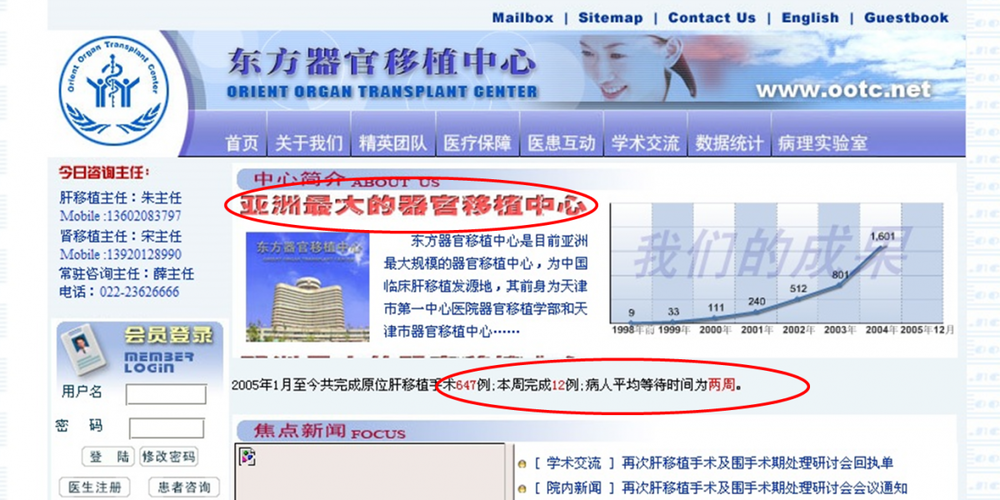
A screenshot from the website of the Tianjin First Central Hospital with a graph showing the annual number of liver transplants. (Screenshot/Tianjin First Central Hospital)
The following conversation is between the Wang and Dr. Li, doctor on duty at the Urology Surgery Department of Beijing Chaoyang Hospital on Dec. 2, 2018.
Wang: “I heard from my friends that sometimes you go directly to the source of kidneys to get the organs. Sometimes (the organs) are transferred through a broker, from outside of the hospital. Now there is no more broker, right?”
Dr. Li: “There may still be brokers, but normally the sources are…”
Wang: “The organs taken by the brokers are also the normal organs from Falun Gong [practitioners], and the organ sources are the same, right?”
Dr. Li: “Yes, all taken by them.”
Wang: “My question is, what the brokers take and what you take are the same thing, right?”
Dr. Li: “Right, right, right.”
Wang said the above investigation is very important new evidence for the crime of live organ harvesting.
“When The Epoch Times broke the news of live organ harvesting of Falun Gong practitioners in 2006, the Chinese Communist Party [CCP] wanted to cover it up by claiming that the organs came from the death-row prisoners.
“After they found out that death-row prisoners were too few for the transplants done every year, and that harvesting organs from death-row prisoners was also not accepted by the international medical community, they tried to say that they would set up an organ donation system and would use only donated organs in the future.
“However, people soon found out that their organ donation system was a hoax, as for one, none of their claimed organ donation centers had enough donors to sustain the huge number of organ transplants in China; two, people could never find out information regarding the donors.
“If the organs are really from legitimate donors, all the information should be transparent. But in China, transparency doesn’t exist.”
Wang said that when organ donation system was not good enough to convince the outside world, the CCP managed to attribute the source to organ brokers in the black market.
“Now if the doctor admits that the organ sources of organ brokers and hospitals are the same, what does that mean? It means that ‘brokers’ are only a disguise for the state-sanctioned business,” Wang said.
‘What is the Price?’
When Wang Zhiyuan asked about the price of the organ transplant, Wang Jianli, associate chief physician of the of Organ Transplant Institute, Beijing Armed Police General Hospital, said that the price was “not high,” and “200,000-300,000 yuan [US$28,000 to $43,000] would be good enough” for a liver transplant.
Dr. Li of the Urology Surgery Department of Beijing Chaoyang Hospital asked 100,000 yuan (US$14,000) for up-front payment for a kidney transplant.
Wang said that usually a liver transplant in China costs 700,000 to over 1 million yuan (US$101,000-144,000). He believes he was given a “discount” price because Wang Jianli believed he was a high-ranking official in the Political and Legal Affairs Commission.
Wang Zhiyuan said the astronomical profit from organ harvesting is one of the reasons why this crime against humanity is still happening on a large scale in China.
Genocide
Forced organ harvesting in China developed as an aspect of the persecution of Falun Gong.
In 1999, the then-dictator Jiang Zemin ordered a campaign to eradicate this spiritual practice.
Falun Gong involves living according to moral teachings based on the principles of truthfulness, compassion, and tolerance, and doing slow-motion, meditative exercises.
Jiang feared Falun Gong because of the large number of people practicing—estimated at 100 million in 1999 in Western media reports—and the attractiveness of its traditional moral teachings to the Chinese people.
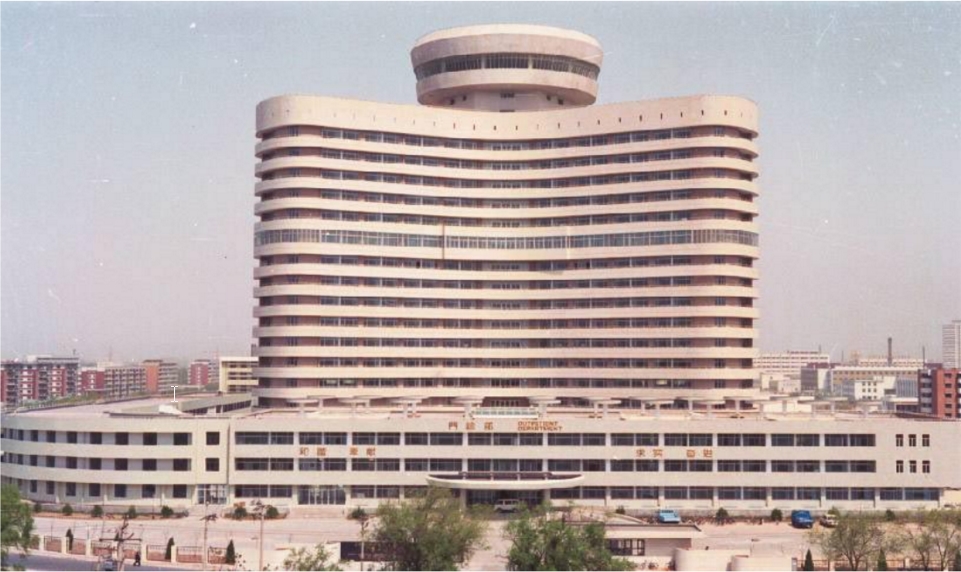
The Tianjin First Central Hospital, which houses one of China’s most active organ transplant centers. (Hospital Files)
In 1999, an immediate uptick in the number of organ transplants done in China is visible, which became more pronounced in subsequent years. For instance, at the Tianjin First Central Hospital, 9 liver transplants were done in 1998, 33 in 1999, and 111 in 2000. By 2004, the number had jumped to 1601.
The coolness recorded by WOIPFG of the top transplant administrators to taking organs from prisoners of conscience contrasts sharply with the account of one of the witnesses interviewed in March 2006, when the Epoch Times broke the story of forced, live organ harvesting from Falun Gong practitioners.
“Annie” was the wife of an eye surgeon at the Sujiatun Thrombosis Hospital in Shenyang City, in Liaoning Province. She reported that her husband had become depressed and had insomnia and nightmares. Finally, he confessed to her that he had been harvesting corneas from living Falun Gong practitioners.
The initial accounts of organ harvesting in Sujiatun were followed up in July 2006 by the report “Bloody Harvest” by David Kilgour, former Canadian crown prosecutor and secretary of state (Asia/Pacific), and international human rights lawyer David Matas, which concluded that the allegations of organ harvesting from Falun Gong adherents was true.
Among the dozens of heads of evidence considered by the report were phone calls made to Chinese transplant doctors in which the doctors admitted harvesting organs from Falun Gong practitioners.
Kilgour and Matas were joined by Ethan Gutmann (author of “The Slaughter: Mass Killings, Organ Harvesting, and China’s Secret Solution to Its Dissident Problem”) in writing “Update.”
Released in June 2016, it is based on “a meticulous examination of the transplant programs of hundreds of hospitals in China, drawing on media reports, official propaganda, medical journals, hospital websites and a vast amount of deleted websites found in archive,” according to the report’s website.
The report concludes that the number of transplants done in China far exceed the official numbers and that the main source for the organs is the killing of innocents, primarily Falun Gong practitioners.
Some researchers are describing this 19 years of mass killing as a “cold genocide.”
Source: https://www.theepochtimes.com/top-chinese-doctors-admit-to-harvesting-organs-from-falun-gong-practitioners_2749094.html
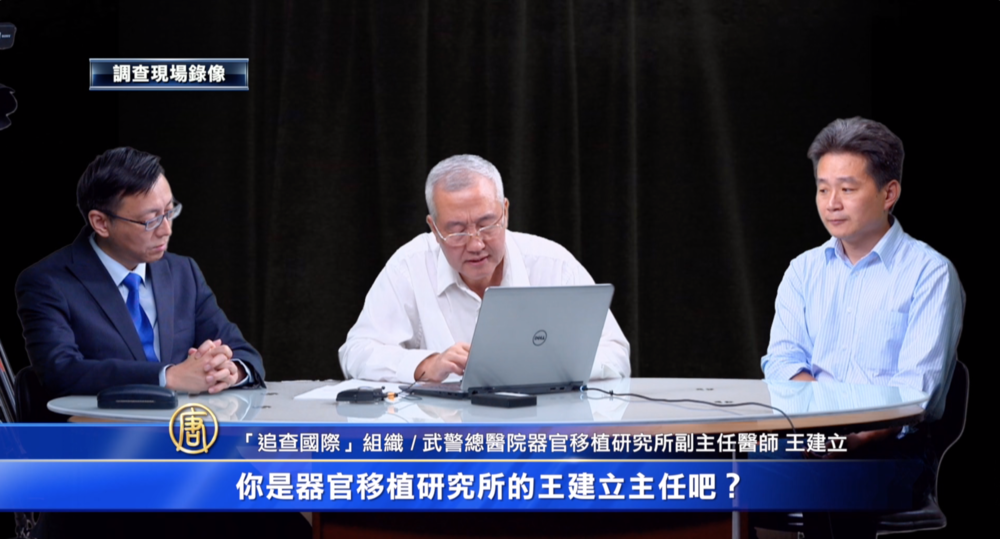
World Organization to Investigate the Persecution of Falun Gong President Wang Zhiyuan (C) makes phone calls to transplant doctors in China, witnessed by NTD commentators Tang Jingyuan (L) and Xia Xiaoqiang (R), in New York City on Nov. 2, 2018. (Screenshot/NTD)
